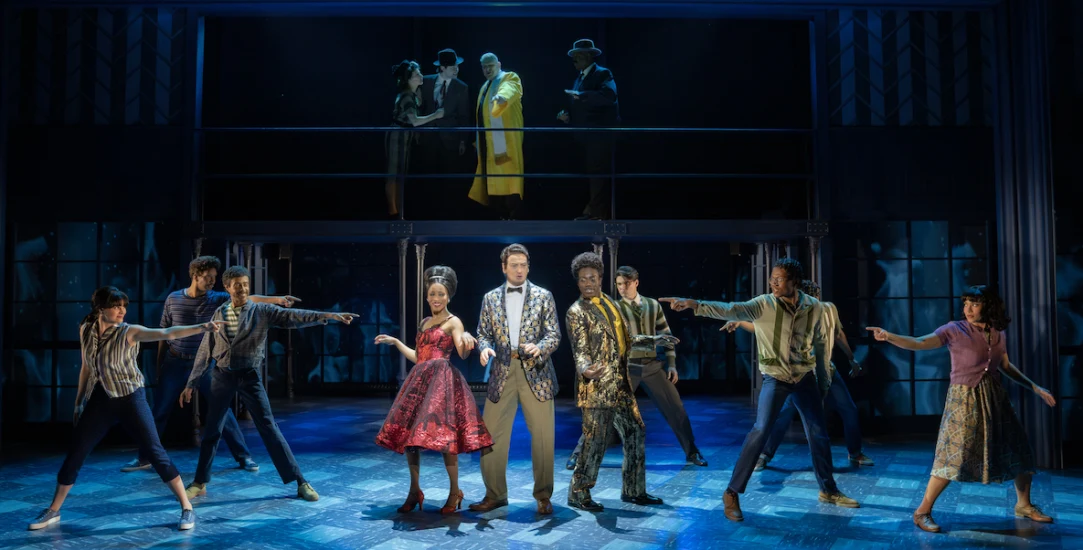'Rock & Roll Man' review - this new musical delivers head-bobbing hits and a few misses
Read our review of Rock and Roll Man, a new musical about the life and career of American disc jockey Alan Freed featuring 1950s hits.
Rock & Roll Man is a hit-and-miss musical. As it charts the rise and fall of Alan Freed, a legendary deejay who broke racial barriers in the 1950s and popularized rhythm and blues with mainstream audiences, it creaks as often as it rocks thanks to a predictable script and uneven mix of music.
Fortunately, the show has saving graces. One is the easy-to-like Constantine Maroulis leading the way as Freed. Known for playing an ’80s hair band member in the musical Rock of Ages, Maroulis is an able actor and singer (even in a wig that seems to have dropped from the sky). He hits the right notes as the show covers Freed’s eventful career.
The show’s other big asset is the ’50s music that Freed spun on air and aggressively promoted. Evergreen earworms like “Peggy Sue,” “Roll Over Beethoven,” and “Great Balls of Fire” come fast and furious in concert sequences when cast members stand in for the likes of early rock and roll icons Buddy Holly, Chuck Berry, and Jerry Lee Lewis.
Other sonic highlights come from a group of singers who nail the rich and velvety harmonies on such familiar songs as “Sixty Minute Man” and “Smoke Gets In Your Eyes.” Valisia LeKae stands out as the fiery R&B singer LaVern Baker, who serves up her hits including “Tweedle Dee” and “Jim Dandy.” Expect head-bobbing from the audience.
On the other hand, Rock & Roll Man gets rough around the edges when it comes to its original songs. Gary Kupper’s compositions turn up as garden-variety ballads and place-fillers instead of driving the story. They’re no match for the oldies but still goodies.
The story, by Kupper, Larry Marshak, and Rose Caiola, seizes upon the well-worn idea that life flashes before your eyes before you die. In Freed’s final vision, he imagines he and his legacy are on trial for crimes against the world. Yes, there was a time when rock music was considered a threat to society.
Freed’s defense lawyer is – good golly! – Little Richard (Rodrick Covington, a bit too cartoonish). The prosecutor is G-Man J. Edgar Hoover (a growly Bob Ari), who had Freed in his crosshairs.
The fever dream device is really just a way to flash back to watch Freed’s life unfold in predictable “and then this happened” fashion. We see Freed go from a Cleveland disc jockey playing mainstream tunes in the early 1950s to a radio sensation and concert producer in New York. He went on to coin the term “rock and roll” and was on top of the world.
Two characters played in broad strokes by Joe Pantoliano helped get Freed there. Leo Mintz owned a record shop where Black and white teenagers hung out together. Morris Levy, who ran a record company and owned Birdland Jazz Club, helped Freed break into producing concerts. Levy’s reputed mob ties meant his assistance came with strings.
Freed dodged various setbacks along the way but crashed following an investigation led by Hoover. He was accused of taking money to play records as well as claiming songwriting credits on tunes he didn’t author. Freed sank into obscurity and the bottle.
Over the show’s 2-plus hours, the design team’s work evokes a fitting period vibe. Director Randal Myler’s staging could never be accused of being subtle. When Hoover removes his shirt to reveal women’s lingerie underneath, it’s a little cheesy.
Following his death in 1965 at age 43, Freed was ultimately inducted into the Rock & Roll Hall of Fame in 1986. It’s an upbeat ending for this music man’s complicated story.
Rock & Roll Man is at New World Stages until September 3. Get tickets at New York Theatre Guide.
(Photo credit: Valisa LeKae, Constantine Maroulis, Rodrick Covington, and the cast of Rock & Roll Man on Broadway. (Phot by Joan Marcus)
Originally published on
